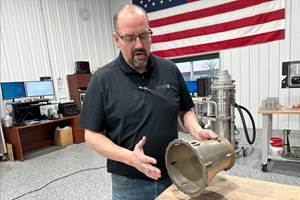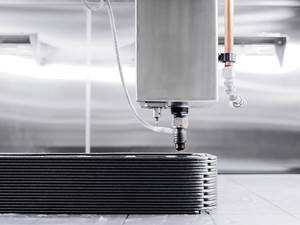Barnes Global Advisors Receives DOD Funding to Develop Resilient Manufacturing Ecosystem
The project funding is tied to critical part needs for the Department of Defense and supports defense industrial base expansion in Western Pennsylvania.
The Barnes Global Advisors (TBGA) has been awarded $1.975 million to demonstrate a self-sustaining advanced manufacturing production campus tied to critical part needs for the Department of Defense (DOD).
This award, funded through the DOD’s Industrial Base Analysis and Sustainment (IBAS) Program’s National Imperative for Industrial Skills (NIIS) initiative, will focus on workforce development programs through training and hands-on applications in a production environment. TBGA will leverage its strategic public-private partnership with the Allegheny County Airport Authority to utilize the Neighborhood 91 advanced manufacturing production campus to support these efforts.
Expanding upon TBGA’s industrial experience and involvement in IBAS-funded regional industrial workforce development investments in Texas, Connecticut, Michigan and California, TBGA will leverage proven advanced manufacturing technologies and solutions to drive secure technology and knowledge transition into an existing U.S. advanced manufacturing production campus. The group will also demonstrate “Tech-Know” transition through a pilot program to address production for DOD supply chain issues while simultaneously up-skilling the regional workforce to meet current and projected needs. Another task is to create a blueprint for a Resilient Manufacturing Ecosystem (RME) that can be readily duplicated within other regions of the U.S., or exported outside the U.S., to support DOD mission and supply chain requirements abroad.
“We are very excited to be supporting the Department of Defense with this effort,” says Andy Davis, TBGA director of government programs. “This Resilient Manufacturing Ecosystem award kicks off what we anticipate will be a multiyear effort, with Phase 1 focusing on initial planning, capacity expansion and sample part demonstrations at Neighborhood 91. Long term, we are committed to delivering a comprehensive advanced manufacturing solution encompassing the entire additive manufacturing value chain for the DoD.”
According to TBGA, the past few years have demonstrated that the U.S. has an urgent need to develop a secure and resilient manufacturing supply chain, with emphasis on resilient. “The development of the Neighborhood 91 production campus was a step forward in this goal and this new workforce development effort will move us to the next phase of implementation,”says John E. Barnes, TBGA president. “You can’t have advanced technology without the knowledge to design for it and use it”.
This RME project is contracted through Texas A&M’s Engineering Experiment Station (TEES) Secure America Institute. Key partners include Catalyst Connection and the Neighborhood 91 industrial base, including Wabtec, Cumberland Additive, Metal Powder Works and HAMR Industries.
The Barnes Global Advisors is a large, independent advanced manufacturing engineering consultancy, headquartered in Pittsburgh, Pennsylvania.
- Watch this video with the AM team discussing how Neighborhood 91 is on its way to becoming an end-to-end ecosystem for production additive manufacturing, with details on the campus’ origins and implications of the initiative.
- Read this first article in a series from TBGA, discussing the nature of production additive manufacturing, in which producing good parts isn’t enough. Understanding the full fabrication process is the first step toward controlling it and ensuring ongoing consistency in the end-use parts.
- Here’s the second article in a series from TBGA focused on additive manufacturing. In proving out a new AM material or process, a supplier accumulates data valuable for internal development and customers’ needs. At what point is there enough data for customers to make confident decisions?
Related Content
ActivArmor Casts and Splints Are Shifting to Point-of-Care 3D Printing
ActivArmor offers individualized, 3D printed casts and splints for various diagnoses. The company is in the process of shifting to point-of-care printing and aims to promote positive healing outcomes and improved hygienics with customized support devices.
Read MoreHow Machining Makes AM Successful for Innovative 3D Manufacturing
Connections between metal 3D printing and CNC machining serve the Indiana manufacturer in many ways. One connection is customer conversations that resemble a machining job shop. Here is a look at a small company that has advanced quickly to become a thriving additive manufacturing part producer.
Read More3D Printing with Plastic Pellets – What You Need to Know
A few 3D printers today are capable of working directly with resin pellets for feedstock. That brings extreme flexibility in material options, but also requires greater knowledge of how to best process any given resin. Here’s how FGF machine maker JuggerBot 3D addresses both the printing technology and the process know-how.
Read MoreBeehive Industries Is Going Big on Small-Scale Engines Made Through Additive Manufacturing
Backed by decades of experience in both aviation and additive, the company is now laser-focused on a single goal: developing, proving and scaling production of engines providing 5,000 lbs of thrust or less.
Read MoreRead Next
Profilometry-Based Indentation Plastometry (PIP) as an Alternative to Standard Tensile Testing
UK-based Plastometrex offers a benchtop testing device utilizing PIP to quickly and easily analyze the yield strength, tensile strength and uniform elongation of samples and even printed parts. The solution is particularly useful for additive manufacturing.
Read MoreCrushable Lattices: The Lightweight Structures That Will Protect an Interplanetary Payload
NASA uses laser powder bed fusion plus chemical etching to create the lattice forms engineered to keep Mars rocks safe during a crash landing on Earth.
Read More3D Printed Polymer EOAT Increases Safety of Cobots
Contract manufacturer Anubis 3D applies polymer 3D printing processes to manufacture cobot tooling that is lightweight, smooth and safer for human interaction.
Read More





















